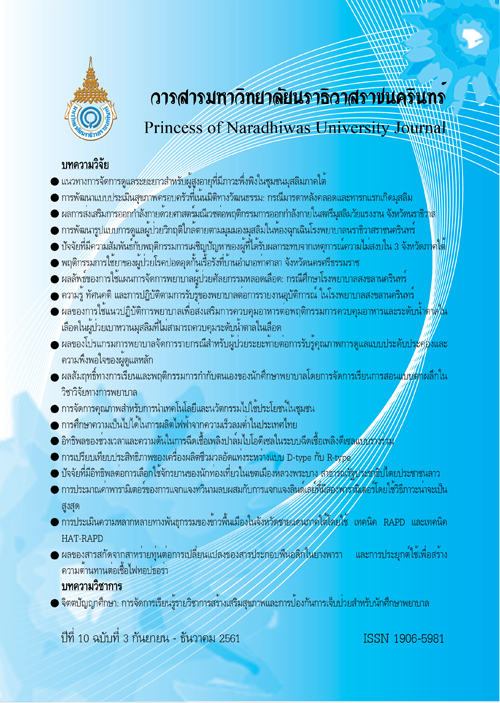A Development of Family Health Assessment Tool Focus on Cultural Dimension: A Tool for Postpartum Mothers and Newborns’ Muslim
มารดาหลังคลอดและทารกแรกเกิด
Keywords:
แบบประเมินสุขภาพ, สุขภาพครอบครัว, มารดาหลังคลอด, ทารกแรกเกิด, มุสลิมAbstract
การวิจัยนี้มีวัตถุประสงค์เพื่อพัฒนาและประเมินผลการใช้แบบประเมินสุขภาพครอบครัวที่เน้นมิติทางวัฒนธรรมสำหรับมารดาหลังคลอดและทารกแรกเกิด โดยใช้กรอบแนวคิดขั้นตอนในการพัฒนาเครื่องมือ 8 ขั้นตอนของเดอเวลลิส(DeVellis) และพัฒนาข้อคำถามด้านครอบครัวจากทฤษฎีการพยาบาลข้ามวัฒนธรรมของไลนิงเกอร์และเมคฟาร์แลนด์ แนวคิดการประเมินสุขภาพครอบครัวของเดนเฮม และทฤษฎีพัฒนาการครอบครัวของดูวาลล์ ตรวจสอบคุณภาพเครื่องมือด้านความตรงเชิงโครงสร้างและความตรงเชิงเนื้อหาโดยการสนทนากลุ่มผู้ทรงคุณวุฒิ และประเมินผลโดยการสนทนากลุ่มผู้ใช้เครื่องมือ
ผลการวิจัยพบว่าแบบประเมินที่พัฒนาขึ้น ประกอบด้วย 2 ส่วน คือ ส่วนที่ 1 ข้อมูลทั่วไปของครอบครัว และสิ่งแวดล้อม
จำนวน 5 ข้อ ได้แก่ ข้อมูลของครอบครัว ลักษณะที่อยู่อาศัย แผนที่ตั้งของบ้าน ผังเครือญาติ และข้อมูลสมาชิกครอบครัว ส่วนที่ 2
ข้อมูลสุขภาพครอบครัว ประกอบด้วย 4 ด้าน คือ 1.ด้านร่างกาย มี 4 ประเด็น ได้แก่ 1.1 สุขภาพมารดาหลังคลอด-ทารกแรกเกิด
1.2 พฤติกรรมสุขภาพ 1.3 การดูแลสุขภาพตามบริบททางวัฒนธรรมของหญิงหลังคลอด-ทารกแรกเกิด 1.4 การดูแลความเจ็บป่วย
ในภาวะเฉียบพลัน ภาวะเรื้อรัง และการฟื้นฟูสภาพ 2. ด้านจิตใจ มี 5 ประเด็น ได้แก่ 2.1 การปรับตัวเข้าสู่บทบาทบิดามารดา
2.2 ความเครียดและการจัดการ 2.3 ภาวะซึมเศร้าหลังคลอด 2.4 กิจกรรมผ่อนคลายความเครียด 2.5 ความเชื่อ - ค่านิยมด้าน
สุขภาพ 3. ด้านสังคม มี 5 ประเด็น ได้แก่ 3.1 การจัดแบ่งหน้าที่และความรับผิดชอบของสมาชิก 3.2 สัมพันธภาพระหว่างบิดา
มารดาบุตร 3.3 สัมพันธภาพในครอบครัว 3.4 สัมพันธภาพกับเพื่อนบ้าน 3.5 ความปลอดภัยในสังคม และ 4. ด้านจิตวิญญาณ
มี 3 ประเด็น ได้แก่ 4.1 ความเชื่อและศรัทธาทางศาสนา 4.2 ปรัชญาและเป้าหมายชีวิต 4.3 การปฏิบัติกิจกรรมทางศาสนา การ
ประเมินผลจากการใช้แบบประเมิน พบว่า บรรลุวัตถุประสงค์ มีความตรงตามสภาพ เหมาะสม มีประโยชน์ สามารถนำไปใช้ได้
ผู้ใช้พึงพอใจแบบประเมินในระดับมาก ข้อเสนอแนะ ควรศึกษาแบบประเมินจนเข้าใจก่อนการนำไปใช้ และระมัดระวังในการ
แปลคำศัพท์ทางการแพทย์เป็นภาษามลายูถิ่น
References
DeVellis, R.F. (2017). Scale development theory and applications. USA: University of North Carolina, Chapel Hill.
Duvall, E.M. (1977). Marriage and family relationships. Philadelphia: Lippincott. Faculty of nursing, Princess of Naradhiwas university. (2016). Bachelor of nursing science revised edition 2016. Narathiwat: Faculty of nursing, Princess of Naradhiwas university. (in Thai)
Jongudomkarn, D., Wacharasin, J., Deoisares, W., Phuphaibul, R. & Surakarn, P. (2015). Family and caring
for the ill members: suggestions based on a documentary research. Journal of Nursing Science & Health, 38(4), 100-113.
Kaewprom, W. (2009). Developing a family health needs and problems assessment: a case study at Wangsapung
care unit, Wangsapung distric, Loei province. A thesis for the degree of master of nursing, Khon Kaen University. (in Thai)
Leininger, M. & McFarland M.R. (2002). Transcultural nursing: concepts, theories, research, and practice. (3rd ed.) New York: McGraw-Hill.
Narathiwat provincial statistical office. (2017). Narathiwat provincial statistical report: 2017. Bangkok: National statistical office, Ministry of digital economy and society. (in Thai)
Siriphan, S. & Elter, P.T. (2016). The importance of cross-cultural knowledge and abilities in nursing care for
mothers and newborns. The Southern College Network Journal of Nursing and Public Health, 3(3), 220-232.
Thanakroekkiat, P., Kanjanawetang, J. & Neamskul, W. (2011). A study of family health of families living in
Uttaradit province. Journal of Nursing and Health Sciences, 5(2), 92-105.
Wacharasin, C., Deoisres, W. & Sawatphanit, W. (2016). Impact of a behavioural consultation programme development. The Journal of Nursing Council, 31(2), 17-27.




